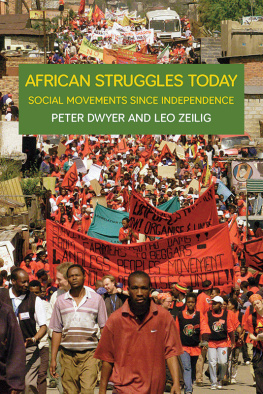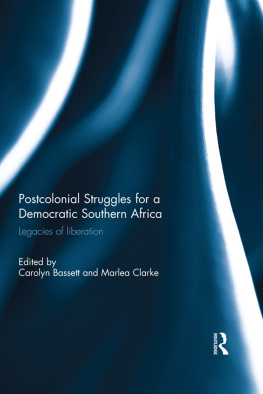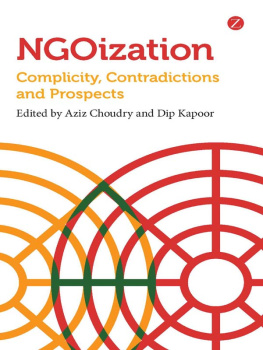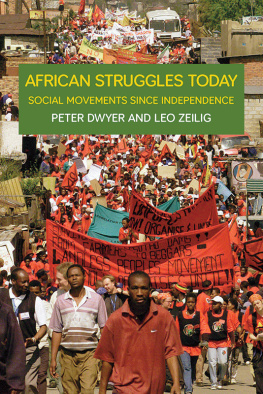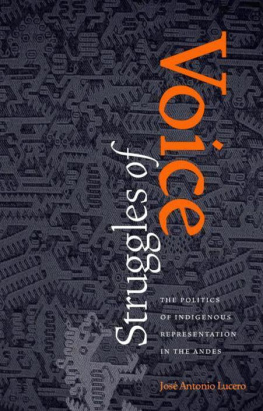Zeilig Leo - African struggles today: social movements since independence
Here you can read online Zeilig Leo - African struggles today: social movements since independence full text of the book (entire story) in english for free. Download pdf and epub, get meaning, cover and reviews about this ebook. City: Africa;Southern;Sub-Saharan;Afrika;Chicago;Ill;Southern Africa;Sub-Saharan Africa;Subsaharisches Afr, year: 2012, publisher: Haymarket Books, genre: Politics. Description of the work, (preface) as well as reviews are available. Best literature library LitArk.com created for fans of good reading and offers a wide selection of genres:
Romance novel
Science fiction
Adventure
Detective
Science
History
Home and family
Prose
Art
Politics
Computer
Non-fiction
Religion
Business
Children
Humor
Choose a favorite category and find really read worthwhile books. Enjoy immersion in the world of imagination, feel the emotions of the characters or learn something new for yourself, make an fascinating discovery.
- Book:African struggles today: social movements since independence
- Author:
- Publisher:Haymarket Books
- Genre:
- Year:2012
- City:Africa;Southern;Sub-Saharan;Afrika;Chicago;Ill;Southern Africa;Sub-Saharan Africa;Subsaharisches Afr
- Rating:3 / 5
- Favourites:Add to favourites
- Your mark:
- 60
- 1
- 2
- 3
- 4
- 5
African struggles today: social movements since independence: summary, description and annotation
We offer to read an annotation, description, summary or preface (depends on what the author of the book "African struggles today: social movements since independence" wrote himself). If you haven't found the necessary information about the book — write in the comments, we will try to find it.
This groundbreaking analysis examines the gains, contradictions, and frustrations of twenty-first century prodemocracy struggles across Southern Africa
Zeilig Leo: author's other books
Who wrote African struggles today: social movements since independence? Find out the surname, the name of the author of the book and a list of all author's works by series.
African struggles today: social movements since independence — read online for free the complete book (whole text) full work
Below is the text of the book, divided by pages. System saving the place of the last page read, allows you to conveniently read the book "African struggles today: social movements since independence" online for free, without having to search again every time where you left off. Put a bookmark, and you can go to the page where you finished reading at any time.
Font size:
Interval:
Bookmark:
Acknowledgments
Social movements of the world, let us advance towards a global unity to shatter the capitalist system!
Final Declaration of the Social Movements Assembly
World Social Forum, February 10, 2011, Dakar, Senegal
This book is a reflection of our interest in the resistance to oppression and exploitation by the peoples of Africa. We have been writing, working, living, and visiting in parts of Africa for twenty years and we draw many lessons and much inspiration from its extraordinary history of struggle. A fundamental premise of this book is a recognition that social change is about more than just great leaders; change is often driven from below by those who are excluded from the pages of academic and historical books. This book is a story about the puzzled, disillusioned, well-organized, and angry men and women who continue the struggle to transform their lives and societies for the better.
The roots of this book go back to our attendance at two workshops in Johannesburg. The first was conducted by the Southern Africa Centre for Economic Justice and the other by the Congress of South African Trade Unions (COSATU). It struck us that among a group of progressive academics, researchers, activists, and non-governmental organizations (NGOs) from Southern Africa, little was collectively known about the condition and political role of progressive civil society organizations (CSOs) in the region. At the two-day planning workshop on political education, the fifteen or so participants admitted they knew little about the state of civil society in Africa. There was a practical gap in knowledge within Africa and between movements in the global south and north. There was also a tendency to uncritically romanticize nationalist movements, while in the north and at various social forums there was much talk of one united anticapitalist movement. We have sought to integrate an analysis of the complexities of the continents recent history with an understanding of really existing movements.
We owe an enduring debt to Miles Larmer for undertaking much of this research with us. The book would never have been completed were it not for his involvement, his research, and the lengthy discussions (and comradely disagreements) we had with him. If he did not agree with the conclusions the book reached, this only serves to illustrate what complex and important work this is.
We must also thank Anthony Arnove and Julie Fain at Haymarket Books, who have encouraged and supported us with the book from the start. David Whitehouse has been central to the painful process of completing the book. He read and edited various drafts very closely and provided invaluable advice and criticism. Sarah Grey deserves thanks as well for her painstaking work on the completed manuscript. Thanks to Emily Albarillo for proofreading.
The book also, in part, reflects an ongoing working relationship with David Seddon, who has so often shared with us his passion and deep understanding of the issues that have long preoccupied us. We have also benefited from the long-standing solidarity and comradeship of Femi Aborisade, Tafadzwa Choto, and Andy Wynne. We have both been inspired and influenced for years by Alex Callinicos and Colin Barker; their influence on us can be found in these pages. Colins own research on social movements, which manages to be both highly original and grounded in Marxs writing and method, has helped shape many ideas in this book.
Peter Dwyer, Oxford
Leo Zeilig, London
April 2012
Chapter 7
Social Forums and the World Social Forum in Africa
The growth and development of the anticapitalist movement since the late 1990s coincided with a period of increased activism among social movements in Africa. As we have argued in earlier chapters, political democratization in most of the region in the early 1990s significantly opened the political space available for civil society activity, while not generally translating into effective influence on governmental policy-making. In more repressive states, social movements played an important role in resisting dictatorship and authoritarianism (see chapter 6). Simultaneously, the debt crisis and the economic liberalization demanded by donors and international financial institutions reduced African nation-states capacity for repressing social movement activism (compared to earlier phases of postcolonial nationalist rule) and increased the capacity of social movements to articulate economic and social injustices. Globalization has reduced the extent of autonomous national sovereign decision-making, but also opened up the potential for cross-border communication and cooperation between social movements to present alternatives to neoliberal globalization, including those generated by the international antiglobalization movement. This leads some observers to identify or assume a virtuous relationship and a coincidence of interests between the activities of both African social movements and the antiglobalization movement.
The key question addressed by this chapter is: To what extent are the assumptions at the heart of the anticapitalist movement accepted by social movements in these countries? Do they view the movement and its initiatives as relevant to them? Should the movement change to become more responsive to them? Viewed from an African perspective, what does this tell us about the underlying assumptions of the anticapitalist movement regarding the relative importance of political movements at a global and local level? Finally, how and in what ways are African social movements using the forum model to articulate their aims and aspirations at the local, national, and regional levels?
Globalization, anticapitalism, and transnational social movements
Transnational social movements are, of course, not new phenomena. The anti-slavery movement of the early nineteenth century, the feminist emancipation campaign, and the international peace movement of the inter-war period were all transnational to some degree. Nevertheless, social movements were generally constructed in relation to their (usually Western) national states during the twentieth century. After the 1970s, however, environmental and peace movements placed an increasing emphasis on transnational collective action by a small minority of networked activists. The legacy of the direct action approach of organizations such as, for example, Greenpeace can be found in todays anticapitalist activism, much of which is based on highly visible direct action carried out by a self-selecting, voluntarist group of activists. It should be evident that, while such movements claim global reach and legitimacy, they are in practice organizations based in a handful of mostly Western states.
As outlined in chapter 2, Africa experienced many of the first protests against neoliberal economic policies in the mid-1980s, in the form of bread riots against structural adjustment policies imposed by the International Monetary Fund. However, the first self-conscious manifestation of the modern anticapitalist movement is generally agreed to be the Chiapas rising by the Mexican Zapatistas against the North American Free Trade Agreement (NAFTA) in January 1994. This appeared to herald the possibility of a global movement that, in the wake of the collapse of the Soviet bloc, could articulate a progressive, democratic model of socialism that would break from that movements Eurocentric origins. Since the demonstrations in Cologne and Seattle in 1999, a wealth of literature has analyzed the positions and perspectives of the anticapitalist movement. The vast majority of this literature focuses on the inequities of globalized neoliberal capitalism rather than the nature of the movement itself. However, it is precisely from its analysis of the nature of twenty-first-century capitalism that the strategy and tactics of the movement flow. As Harvey describes, a new stage or phase of neoliberal globalized capitalism arose from the crisis in the international economic order in the mid-1970s, when the class compromise of the long postWorld War II boom (predicated on steady and predictable global economic growth) broke down. Since the late 1970s, neoliberal economic policies (such as privatizing state-owned companies, commercializing state services, removing barriers to international trade, and reducing state subsidies to businesses) have been implemented to a greater or lesser extent in almost every part of the world.
Font size:
Interval:
Bookmark:
Similar books «African struggles today: social movements since independence»
Look at similar books to African struggles today: social movements since independence. We have selected literature similar in name and meaning in the hope of providing readers with more options to find new, interesting, not yet read works.
Discussion, reviews of the book African struggles today: social movements since independence and just readers' own opinions. Leave your comments, write what you think about the work, its meaning or the main characters. Specify what exactly you liked and what you didn't like, and why you think so.

